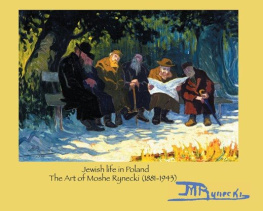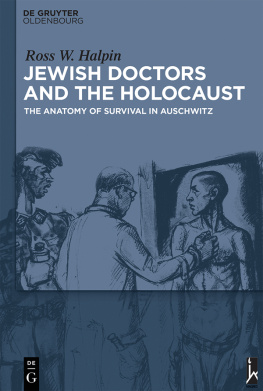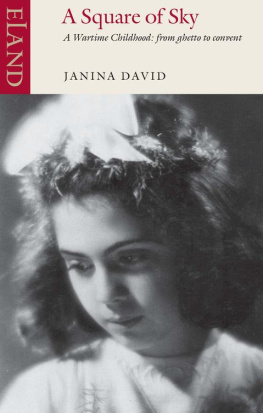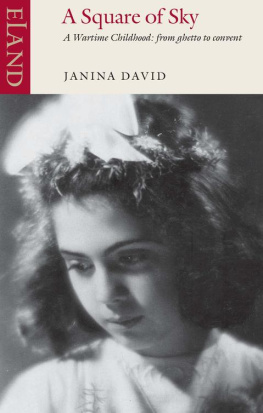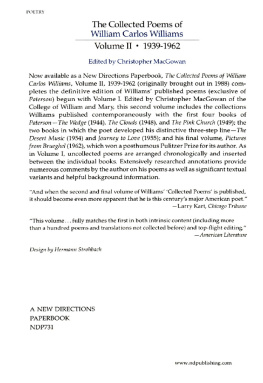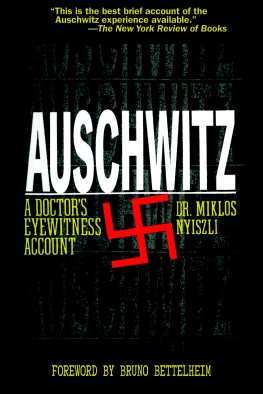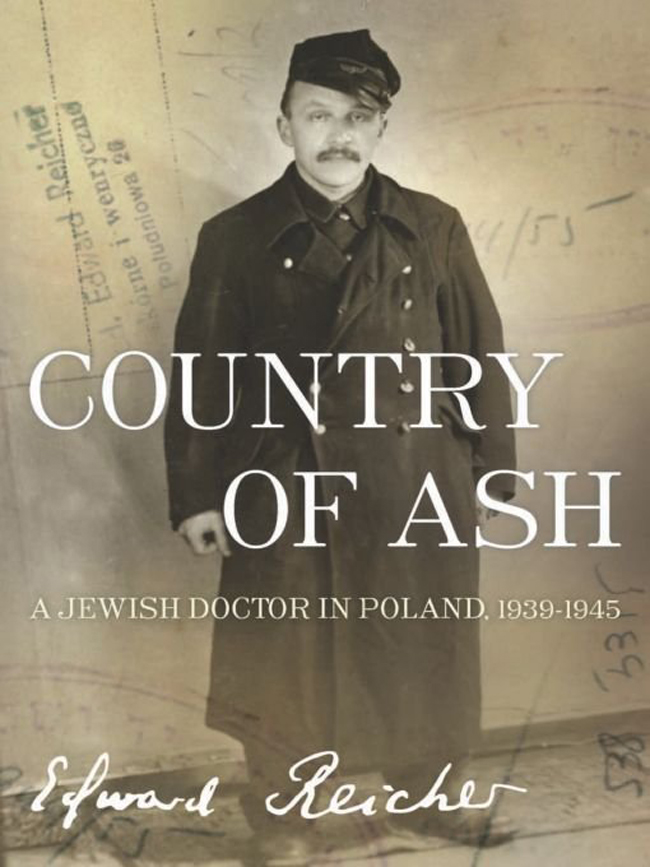Table of Contents
A true coward is one who fears his own memories.
Elias Canetti
TRANSLATORS FOREWORD
Magda Bogin
That Edward Reicher, a Jewish doctor from Lodz, should have lived through the Nazi occupation of Poland and the ghettos of both Lodz and Warsaw, from which more than 500,000 Jews were sent to their deaths or killed during World War II, is remarkable. The odds were entirely against him. That he should have done so with his young wife and small daughterand without ever leaving Warsawis astounding. The story of this book parallels the improbable arc of their survival.
Dr. Reichers account, which he began to write in 1944, was lost in the last days of the war as he and his family played a deadly game of cat-and-mouse with the Gestapo and Polish informers. Under assumed names and in separate hiding places on the Polish side of Warsaw, to which they had fled in a vegetable cart after three years in the ghetto, they lived in unrelenting terror for nearly three more years, moving constantly in a series of close calls, wrenching decisions and daredevil escapes.
Reicher reconstructed his story in the early 1960s, many years after the events he describes. His intent was simple and without literary pretense: to leave behind a record of what he and his family had endured, in the hope that future generations would choose humanism over savagery.
Despite his modest aim, what he produced reads like a novel. Country of Ash is a vivid canvas of life in the ghettos from which hardly anyone emerged alive, an almost photographic record of the suffering, cruelty, heroism, ingenuity, despair, chance encounters and, in the end, the unexpected kindness of strangers that spelled the difference between death and life for Reicher, his wife Pola and their little daughter.
But this is far more than the story of a single family. Reicher peopled his manuscript with dozens of characters whose lives intersected in a world of unprecedented evil and transcendent grace. Some of them, like Herman Hfle, the cherub-faced Nazi commander who oversaw the liquidation of the Warsaw ghetto and, years later, unrepentant, hung himself while awaiting trial after the war, are well-known to historians, as is Chaim Rumkowski, the delusional self-proclaimed King of the Jews, Reichers former neighbor, who ran the Lodz ghetto for the Germans before allegedly being burned alive by fellow inmates at Auschwitz. Then there is Janusz Korczak, the head of the Jewish orphanage in the Warsaw ghetto, who accompanied his charges to Treblinka, refusing to save himself and abandon them alone to their fate. Others belong to the ranks of workers, doctors, thieves, swindlers, aristocrats, musicians and nunssome heroes, some villains, but all inmates of the prison that was Poland under Nazi rule. Unforgettable are Toni Schmidt, the German conscript from the Sudetenland who fell in love with Reichers young sister-in-law Alina and risked his life to supply the hidden family with food; Yola Glicenstein, the beautiful teenager who became a ghetto cause clbre for stealing bread to save her starving parents; Leon Kac, the Jewish barber to the Gestapo, who believed to the end that he and his family would retire to the Riviera after the war; and Roza Chmielewska, the Warsaw prostitute who led Reicher to her home just as a Polish crowd prepared to turn him in to the Gestapo.
Finally, there are the thousands of Jews trapped in the shrinking ghetto, whom Reicher portrays from the vantage points of the rooftops or cellars where his family had taken momentary refuge: the daily columns of Jews being marched to Treblinka, growing smaller and smaller, as at the end of a film and the hundreds of young Jewish fighters, many exuberantly marrying as they prepare to die in the uprising of 1943 (after one such wedding, Reicher and his wife are smuggled back to their basement hideout in a hearse, riding in two coffins side by side.)
Reichers portrait of wartime Warsaw through Jewish eyes, first from within the ghetto and then from the Polish side, gives us a twentieth century vision of hella view that evokes the teeming paintings of Brueghel but whose understated grief pays tribute to the doomed characters he so hauntingly describes, including his own father.
Edward Reicher died before his work was published. In 1989, fourteen years after his death, his original version was published by a Polish exile press in London at the behest of his daughter Elisabeth.
Seen first in these pages as a toddler asleep in her crib while German planes strafed Lodz, then as a four-year old learning to dance in the Warsaw ghetto and finally as a six-year old who was given a false name, delivered to a Warsaw convent and separated from her parents at the height of the war, Elisabeth Reicher eventually settled in France, where she became a psychoanalyst specializing in the effects of trauma.
Twice married to non-Jews and diligent in her profession, Elisabeth Reicher is in a way the heroine of her fathers story, which she rescued from oblivion just as her father once rescued her from death. In 1990 she and Jacques Greif, a friend and colleague of her fathers, translated Edward Reichers book from Polish to French.
It is hardly surprising that the hidden child who knew that her own and her parents lives depended on her ability to conceal her true identity should have struggled to define herself or that she should have chosen psychology as a profession. In her preface to the French edition, Reicher alludes to the pain of growing up after the war in a drastically diminished familyone in which the living had to take the place of the dead. For a long time, she writes, I did not enjoy hearing my fathers stories or remembering my own; I even denied their importance.
Only after her fathers death, reading the manuscript he had left behind, did she come to appreciate her parents acrobatic efforts to survive and to understand, as she puts it, that I could not shortchange the past. In subsequent scholarly articles, she explored the shadows of the Holocaust in more dispassionate prose. Assimilation may overlap with an effort to adapt in order to survive, she wrote in the psychoanalytic journal Controverses. But pain left unexpressed is a mute witness, like a burning ember ready to flare up again. That witness, like a transfusion, is transmitted from parents to children. Was she describing herself?
We can only guess. But facing her own death from cancer in 2006, Elisabeth Reicher asked that a Star of David be placed on her coffin.
Now, like a time capsule or a scrapbook miraculously salvaged from beneath the floorboards of a bombed-out ruin, Country of Ash appears in English fifty years after it was written, thanks to a small group of French survivors who believed that it deserved a wider audience.
There is an entire literature of the Shoah, yet here is a book that tells a story unlike any other. Unlike Primo Levi or Elie Wiesel, Paul Celan, Andr Schwarz-Bart, Ida Fink or Nellie Sachs or so many other survivors whose works have stirred millions, Edward Reicher was not a writer. Though we might disagree, he considered himself an ordinary man. After the war, when Herman Hfle was finally brought to trial for war crimes, Reicher was asked to testify against the man who had been his patient when he was forced to join the Gestapos team of Jewish doctors. I went, he writes, as the representative of all those who had been gassed and incinerated in Treblinka, killed in the ghetto or suffocated to death in the cattle cars carrying them to the concentration camps.



